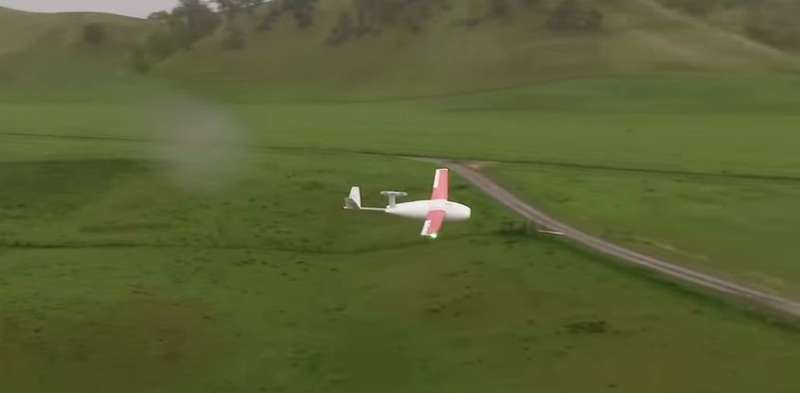April 5, 2018 weblog
Zipline's delivery drone system redesign boosts capabilities

A delivery drone company that has helped Africans in dire need of emergency blood supplies is widening its vision. The California-based company is Zipline and its autonomous planes are making news closer to its home in the United States.
A video tells viewers that they are looking at "the fastest commercial delivery drone on earth."
But why stop there. Zipline even notes it "flies further, faster and with more cargo than was ever before possible—even in high altitude, heavy wind or rain."
They build their planes and run daily test flights from California. The latest news is that their new aircraft is part of a complete redesign of Zipline's logistics system. They redesigned the entire system and operation from top to bottom, said CEO Keller Rinaudo.
They are out to make improvements to their capabilities, from launch to flight to landing.
How so? The new improvements will cut time between Zipline's receipt of an order and launch of a fulfilment flight—from 10 minutes to 1.
They are to increase the number of daily delivery flights that each Zipline distribution center can make. It was 50 and it is going up to 500.
They are to expand the radius of each distribution center to serve bigger populations.
The autonomous air craft have been flying on predetermined routes. A Zipline operator monitors the airspace.
MIT Technology Review reported a top speed of the new drone to be "128 kilometers an hour (a hair shy of 80 miles per hour)."
They can fly 99 miles in one round trip.
Their delivery planes are not to be confused with average quadcopters; the new plane can fly four times faster than the average quadcopter drone. It can serve an area 200 times as large.
Between the lines: Zipline is re-designing itself as a medical drone delivery service poised to do serious business. Zipline plans to expand its operations and deliver commercial delivery service to the United States by the end of 2018.
Quartz quoted Rinaudo: "We strongly believe that the promise of this technology isn't delivering tennis shoes to your backyard."
Apart from speed and scope, another feature they can promote is their streamlined process.
Jeremy Hsu in Discover: Humans working in distribution centers focus on loading new drones with packages, swapping in fresh batteries and removing drone parts for maintenance based on decisions and checklists issued by the computer-driven system.
Doctors and nurses "can remain blissfully unaware of all the moving parts behind the scene as they send orders to Zipline via text message."
Zipline needs no introductions in Rwanda where it has delivered medical supplies to local health workers. The Zipline delivery drone was designed to parachute medical supplies to remote hospitals and clinics. Zipline has delivered blood products to over a dozen transfusing facilities. Hospitals had spent hours to pick up blood at a regional center, but, with Zipline, deliveries reached facilities in less than 30 minutes.
Mike Murphy in Quartz: "The US doesn't have a national healthcare service like Rwanda, however, so the company would be working with individual healthcare companies to provide delivery support."
"Our Zips can deliver all essential medical products, including cold-chain-dependent items. We currently deliver blood to rural hospitals in Rwanda and are in active discussions with our customers to expand to other medical supplies and animal health products (e.g. vaccines and artificial insemination)," according to the team.
The Federal Aviation Administration's (FAA) had announced the pilot program, UASIPP in support of safe commercial drone innovation in the country. What's next: The FAA is expected to formally approve UASIPP projects. Zipline projects chosen as a part of this process would start operation by the close of 2018. MIT Technology Review reported that "The startup has signed partnerships with several health-care systems in the US and hopes to have projects up and running by the end of the year."
Hsu said, that "the new and faster Zips won't be flying just blood packs. Zipline's expanded array of medical supply deliveries could include antivenom used to counteract snake bites, antiretroviral drugs for HIV patients, and rabies prophylaxis treatments for people bitten by dogs or other mammals."
More information:
www.flyzipline.com/
www.flyzipline.com/uploads/Zipline%20Fastest%20Drone%20Press%20Release.pdf
© 2018 Tech Xplore

















